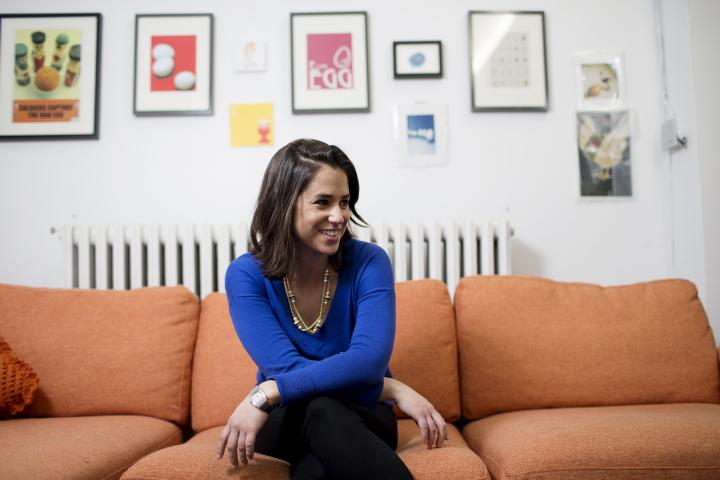Reitumetse Kholumo started her company, Kwela Brews, to help support South African women who practise the art of brewing traditional African beer. Kwela Brews works with women to help them find new markets for their beer and supplies ingredients to help ensure they brew a safe and high-quality product. Ms. Kholumo applied to be part of the Jim Leech Mastercard Foundation Fellowship on Entrepreneurship program as an undergraduate at the University of Cape Town. Following the successful completion of the program, she took home a $10,000 prize in the Dunin-Deshpande Summer Pitch Competition.
Can you tell me a little bit about Kwela Brews?
My grandmother, Mamodise Matjele, was a home brewer of traditional African beer and I first thought that I wanted to be a brewer myself, but that wasn’t enough – I wanted to imagine a world in which Black women could create employment for themselves and where we could reimagine this method of self-empowerment in a way that still centres home brewers but allows more people to access our heritage, which is something we’re very proud of.
What is traditional African beer?
Traditional African beer is made from sorghum, and it is very sacred in African spirituality, but it’s also very linked to our culture. Women mainly brew it and are the custodians of our Indigenous knowledge systems. It’s food before it’s alcohol: in traditional African beer, you use wholesome grains and, unlike barley beer, you don’t separate all the solids out, so you still have grain in the final product. You also drink it while it’s still in the fermenting state, so you get good bacteria along with it.
And you’re honouring your grandmother a little bit as well with Kwela Brews?
Oh, yes, a whole lot. I see myself as a continuation of my ancestors. My grandmother is on our advisory board because we need somebody who has the lived experience. Just having that relationship with my grandma has been a huge learning opportunity for me. Had I not done chemical engineering, I probably wouldn’t be worried about beer, or rethinking how we do development through beer.
It is intriguing how Indigenous knowledge holders can intuit process steps that are scientifically sound.
When you did the summer pitch for Queen’s, you talked about a three-year plan. How are things going?
We were still at around Year 2. Since winning, we’ve been building a core team. I’ve learned that $10,000 isn’t enough to enter the broader market, but the funding really helped in terms of actually grounding Kwela Brews and really affirmed that my idea and work were valid. It’s been very helpful in actually allowing us to operate and in getting the resources for the home brewers so they can do the magic.
Tell me a bit about your experience with the Jim Leech Mastercard Foundation Fellowship on Entrepreneurship.
When I applied, I was new to starting a business and still very wishy-washy in the planning. The program gave me a chance to really reflect on what work I’m trying to do and really opened me to the idea that it is a journey: you’re not going to get it figured out on the first try.
Quality is important at Kwela Brews – can you tell us a bit about that?
We are working with home brewers who use the authentic process, and we provide the ingredients so they don’t compromise on them. We also do quality testing because methanol poisoning is a prominent concern when it comes to home-brewed beer. We know that when brewed according to the authentic process, the good bacteria will out-compete the bad bacteria, because the first stage of brewing creates enough acidity to prevent the pathogenic bacteria from growing in the beer. It is intriguing how Indigenous knowledge holders can intuit process steps that are scientifically sound.
What led to some beer makers in South Africa compromising on quality?
Traditional African beer was outlawed for a long time in South Africa and cutting corners became very popular. If you don’t know when the police are going to raid your home and you spend time and resources on making an authentic product that is actually nutritious and then the police arrive and just spill it out, then you’ve wasted food, you’ve wasted money, you’ve wasted energy. Whereas if you have cut corners, it’s not a good product, but it will still generate an income for you, and you won’t lose as much when the police show up.
Did you ever think that a university 10,000 kilometres away would be helping brew traditional African beer?
Not at all, but I often find that people who are far away can actually imagine something that is different quite easily compared to somebody who is rooted locally. I feel like it was also wholesome, because the people who were 10,000 kilometres away were sometimes my biggest cheerleaders.
Can you talk a bit about your personal journey with Kwela Brews?
From an Indigenous sort of perspective, I see myself as a continuation of my ancestors, so this is a twist of what they would have done a few generations ago. It’s really bringing together our connection to the Earth once again and our connection to each other, because I’m seeing opportunities where other children will want to learn about what the malting process looks like when their grandmas do it and then they can also see the science behind it. It’s been a very wholesome experience to know that school isn’t the only place where knowledge is produced and valuable.


